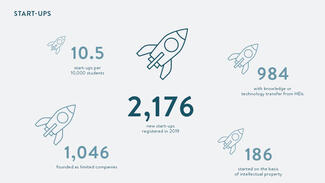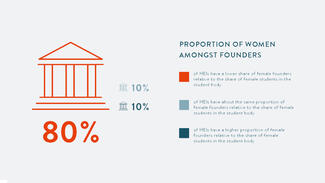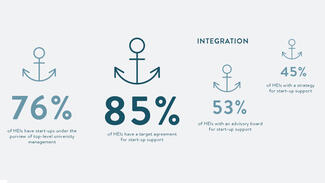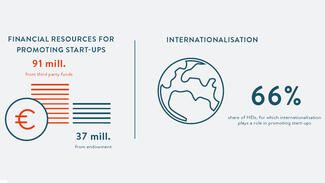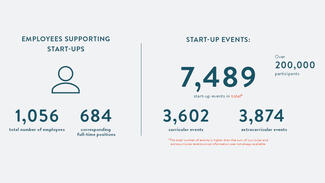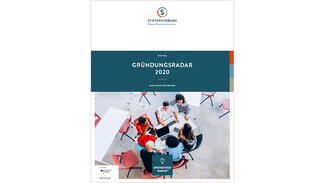
The fifth edition of the Gründungsradar examines and compares the quality of start-up support at German institutions of higher education (HEIs). Moreover, it underlines the important role HEIs play in harnessing innovation and portrays their efforts to foster a dynamic environment conducive to start-ups. For this year's edition, we updated the indicators surveyed; for that reason, temporal comparisons with previous surveys are only possible to a limited degree. Overall, just under 60 per cent of higher education institutions in Germany took part in the survey, which accounts for about four-fifths of all enrolled students. Participating HEIs included almost all HEIs that place significance on the issue of start-ups. The Gründungsradar thus provides a solid data-based foundation for start-up activity and support at German institutions of higher education.
- Frontrunners in the 2020 Gründungsradar: According to the new study indicators, the Technical University of Munich led amongst large HEIs in terms of supporting start-ups; Aalen University of Applied Sciences led amongst midsized HEIs; and the HHL Leipzig Graduate School of Management achieved the best results amongst the smaller HEIs. While the Technical University of Munich and the HHL Leipzig Graduate School of Management defended their top positions, Aalen University of Applied Sciences earned the top spot in its category for the first time.
- The number of start-ups and start-up projects at HEIs continues to rise: A total of 2,176 start-ups were reported by the participating HEIs. This translates into about 10.5 start-ups per 10,000 students at HEIs that support start-ups. At least 984 of the start-ups can be attributed to knowledge and/or technology transfer from the HEIs and 186 to intellectual property such as patents. In addition, 7,389 start-up projects were registered at the participating HEIs in 2019. To put the numbers in perspective, 1,776 start-ups were reported in 2017 and 1,145 in 2012. If we include only the HEIs responding to the current and previous surveys, then the calculation yields 1,658 start-ups in 2017 and 1,872 in 2019 respectively, which corresponds to 11.2 start-ups per 10,000 students at HEIs that support start-ups in 2017, and 12.5 in 2019.
- Start-ups at HEIs rely on third-party funding: Start-up support is still heavily dependent on projects funded by third-parties. Less than 30 per cent of the 128 million euros available for start-up funding in 2019 came from institutional endowments. HEIs often give voice to the consequences, noting the risk of high staff turnover, uncertainty, no sustainable follow-up of ideas and structures, and constant restarts.
- 200,000 participants reached through start-up events: In the 2019 academic year (winter semester 2018/2019 and summer semester 2019), more than 200,000 participants were reached in almost 7,500 events related to start-ups. The majority of universities cover a wide range of start-up content in their courses and offer a high degree of diversity in terms of teaching formats, methods and speakers involved.
- Harnessing networks to promote start-ups: 95 percent of the responding HEIs are members of an institutionalised network dedicated to promoting startups. Qualitative data regarding participation in networks showed that almost all universities benefited from the interaction, coordination and shared support provided by networks.
- Internationalisation of HEIs: The issue of internationalisation plays a role in startup promotion for two-thirds of the responding HEIs. Half of the HEIs have signed international cooperation agreements, while one-third of responding HEIs foster relations with international investors and offer international exchange programmes for founders.
- Evaluation of start-up promotion could be improved: Although the monitoring of start-up projects and start-ups is constantly improving, just under half of the responding HEIs regularly evaluate the work of start-up promotion itself. As a result, programme effectiveness can too often only be measured intuitively instead of by data.
- Women are underrepresented amongst founders: Of the HEIs that provided data on gender, only 10 per cent reported having a higher rate of female founders relative to the student population. The Gründungsradar thus confirms—as do numerous other studies—that women are clearly underrepresented in the start-up scene. 37 per cent of the responding HEIs are trying to counteract this with offers specifically tailored towards women.
- Appeals to policymakers: HEIs call for policies that provide continual financial support to promote start-ups. Many HEIs also call on policymakers to continue and improve funding programmes, calling for more specialisation and expansion, for example. In addition, there are calls to allocate additional personnel resources and their continuation, as well as to simplify application procedures and make relevant changes in legislation at the state and federal level.
PDF download

